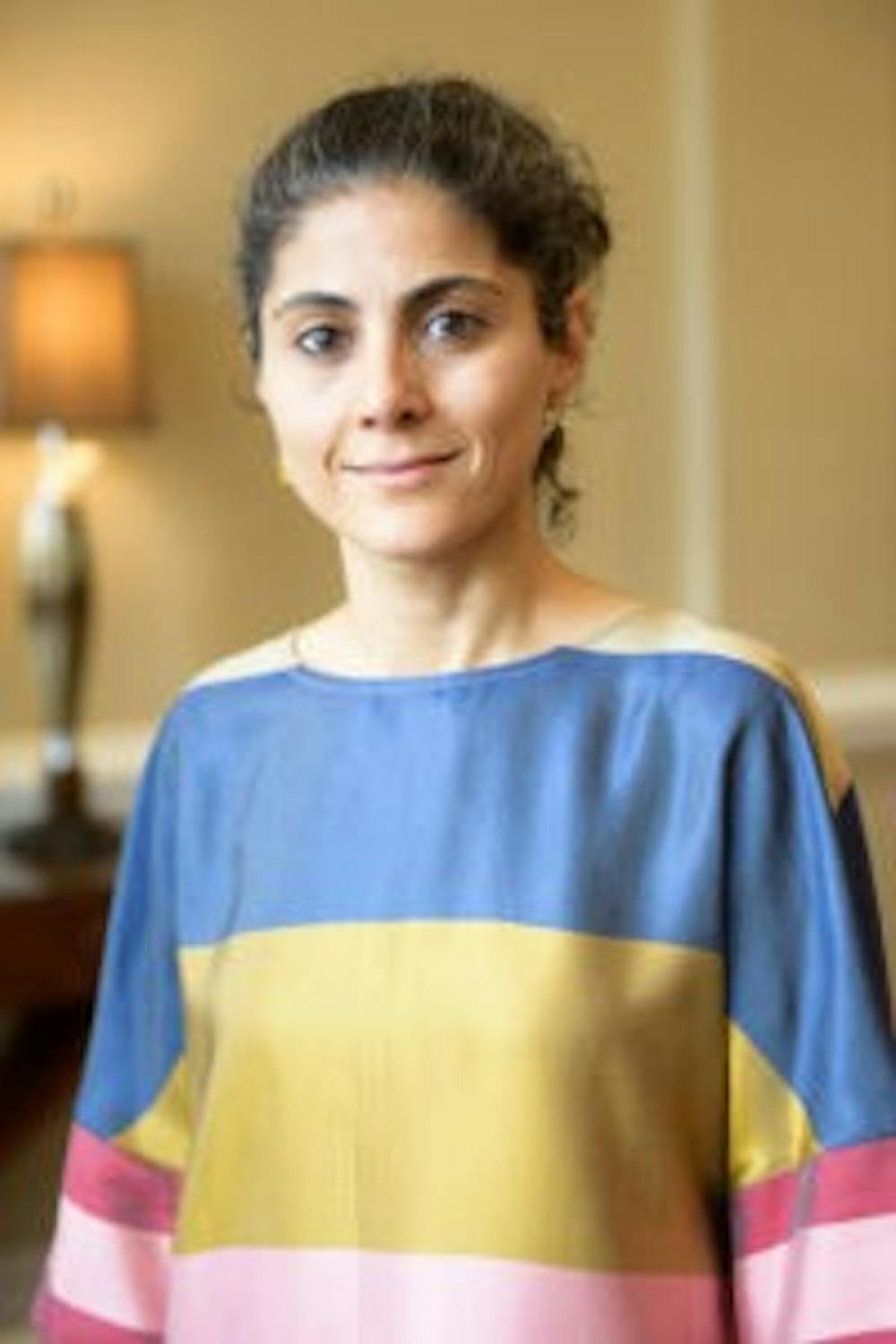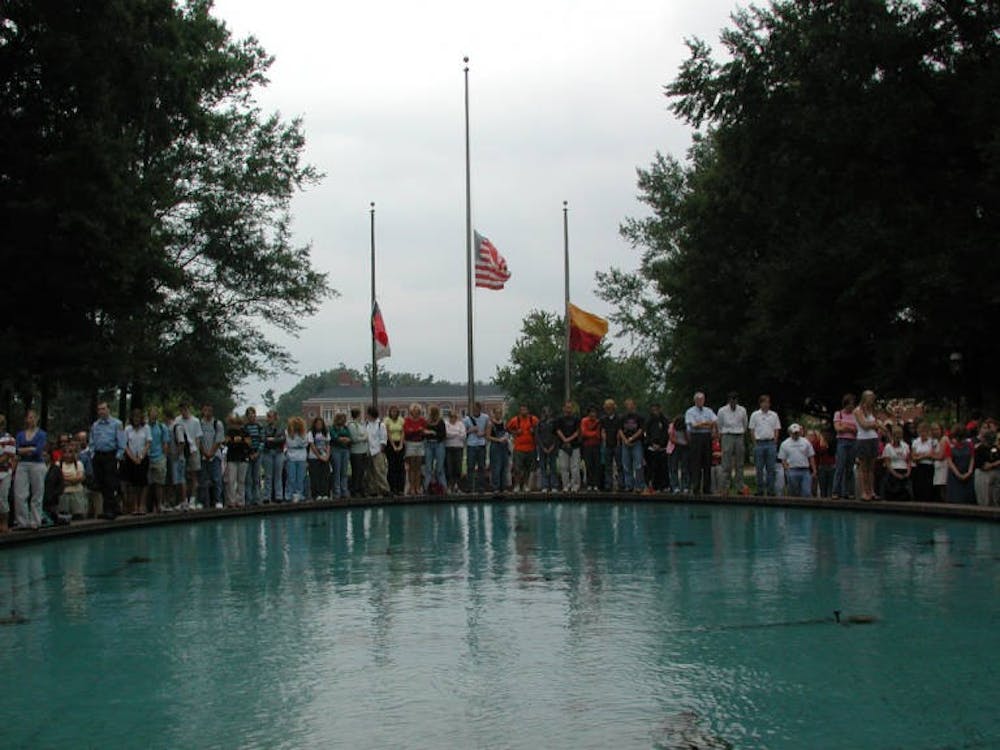Faculty share how their teaching has changed in the 20 years after 9/11.
Nim Batchelor, Associate Professor of Philosophy

Classes: PHL 2100, Critical Thinking; PHL 3300, Economic Justice
How did 9/11 affect your approach to teaching?
“9/11 gave me a reason to be more pessimistic, in my own head, you know, and so it gave me more reason to be cynical and negative in my own outlook on the world. And so how did it affect my teaching? It increased the stress that I feel between what I actually think and what I present in service in the classroom to students –– that I have a professional, moral obligation to come into the classroom and be a certain way with you that is, because of 9/11, more distant from where I actually am in my own thoughts in my own head … I carry a greater chasm between what I am in the classroom and what I actually am on my own, in what we're dealing with here. When I'm talking to my wife or something, I'm much more dark and negative and cynical in my private life than I am in my professional life.”
Ahmed Abdullah Al Fadaam, Assistant Professor of Communication Design

Class: COR 1100, The Global Experience, with a focus on the Middle East
How are you incorporating 9/11 into your classes?
“I always incorporate 9/11 in my classes because I try to show my students the sequence that happened that led to the changes in the region, starting in 9/11 and before and then what came after. We discuss the invasion of Afghanistan, we discuss the invasion of Iraq, then follow 9/11. We also discuss ISIS and try to trace back its history, starting with the Soviet invasion of Afghanistan in 1979 and then the birth of Al Qaeda. And then after 9/11 and the invasion of Afghanistan and Iraq, how Al Qaeda moved to Iraq and started growing into what is known today as ISIS … When I started teaching in 2012, when I used to ask my students about what they remember about 9/11, they would say that they were still like five years old or six years old. And now when I ask them about 9/11, they say that ‘we were never born, we haven’t been born yet.’ So it feels a bit weird because now we have to re-educate them about what happened, tell them how it all started.”
Sumeyye Pakdil Kesgin, Adjunct Assistant Professor of Religious Studies

Classes: REL 1830, Islamic Traditions; REL 1000, Religion in a Global Context
How are you using 9/11 to teach students more about religion?
“What I try to do is to understand, and to not tolerate, but to understand why it happened, and what kind of verses they use from the Quran to justify, and how I could look at those Quranic verses from a different perspective. I always asked whether I could find other interpretations of the same verses they used to justify killing innocent people or hurting innocent people. So, in these terms, I think the attacks have changed my mind in terms of being an educated Muslim and being an educated teacher, a professor in my classes. And I try really hard to show students that it is not my students, it is not one religion or it's not Islam, because people do religion. I always say to my students, people do religion. Religions are not peaceful or violent, people are violent or peaceful. If they are violent, their interpretations of any religion would be violent, and if they are peaceful, it will be, of course, peaceful, so that is how it changed my mind and how I try to understand.”
Lisa Buchanan, Associate Professor of Education

Classes: EDU 2980, Children’s Literature and Arts Integration; M.Ed. Program; EDU 4500, Teaching Diverse Learners in Middle and Secondary Grades
How has 9/11 impacted the curricula of your classes?
“From a personal perspective it very much impacted my teaching from that day forward, and also the ways in which I put my coursework together. I think one of the themes in these two class meetings that I've described is perspective taking and lasting impact, and that's something that I think is present in all the courses that I teach. In thinking about multiple perspectives on an event and also themes related to 9/11 that are bigger than this event, and the aftermath itself, so really thinking about thematically, looking at that. I think it’s really important in teacher education … I was an adult at the time, but many people entering classrooms right now certainly were not adults, and within the next 10 years many of our classroom teachers will be teaching and they weren't not living at the time of 9/11 … I think regardless of whether you were living at the time of 9/11, it should certainly be incorporated.”
Susan Ladd, Instructor in Journalism

Class: COM 1100, Media Writing
How has 9/11 impacted teaching and learning now, 20 years later?
“It really became a hallmark kind of moment in the way they taught their classes. How do you walk into a class and talk about philosophy or anything when something like this is unfolding in real time ... I think that it was such a unique moment in that time; it brought a lot of professors to a point where they felt that they could be more personal with students and they could really sit down and together sort of share this awful experience and all the emotions that people were feeling around it … So many of the students that I teach, I don’t believe were born yet when this happened, so we've got the first, the ‘post-9/11 students’ now. All things that happen before you’re born, they become very abstract … I do spend time in my classes talking about different events that have happened over time because I find that knowledge about them can be pretty limited, and [it’s] important in order to have context for just life events and what's happening in the world.”


